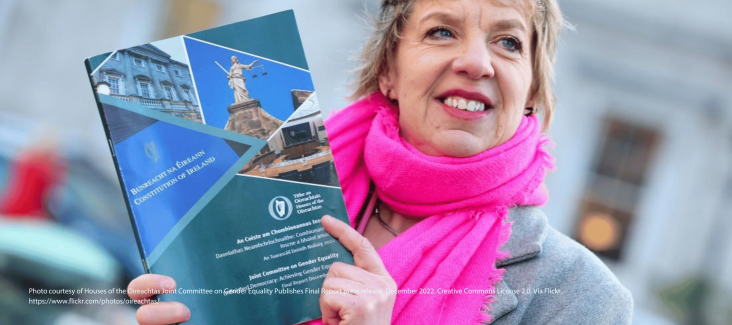DEMOCRACY CAN’T BE SAVED
Some promises can’t be kept. One such promise is the frequently heard pledge to “save democracy.”
In my latest Democracy column, I explain that democracy can’t be “saved” because it is not the sort of thing you save. It’s not a precious artwork on the wall that you must save from a fire, or a penalty shot the goalkeeper saves, or a migrant whom you must save from drowning in the Mediterranean.
Democracy is a form of work best defined (in English) by four words: “everyday people governing themselves.” Democracy is something you either practice, or don’t practice. You just do it or you don’t.
If we thought about democracy as a spectrum, with “everyday people governing themselves” as the most democratic pole, then we’d be thinking much more clearly about the perils and promises of democracy. To learn more, you can read the column here.
THE REAL LESSONS OF FROM IRISH VOTE
Was the decision by Irish voters to reject constitutional changes that came out of citizens assemblies a defeat for the idea of such assemblies, those bodies of regular citizens often chosen by lottery?
It’s a good question. My best answer is no (The Irish Times analysis generally concurs). I’d suggest it might be a victory for tying citizens assemblies to the referendum and other direct democracy procedures.
Many citizens assemblies don’t have power to enact their own recommendations, which makes them too weak. A few can enact changes themselves—but that’s too much power. The better path is what happened in Ireland—bringing together a citizens assembly but forcing those decisions to go to voters before they are enacted.
What do you think?
Citizens assemblies continue to have momentum as a tool—with new assemblies popping up in cities from Râmnicu Vâlcea (the first in Romania) to Bend, Oregon. I don’t see that momentum slowing, especially with the important check of voters on what assemblies produce.
UPCOMING EVENTS
This year, as the first European Capital of Democracy (for the 2023-24 year), Barcelona is hosting even more democracy events than it usually does. Next up are:
• April 11-12. The Democratic Innovation and Participation in the Local World takes places at the Francesca Bonnemaison Space. The conference “aims to be a meeting space with the territory to exchange ideas and experiences among all those actors linked to the world of democratic innovation and participation.”
• May 13-15. ALDA, the European Association for Local Democracy, has scheduled a democracy festival, along with its own General Assembly, in Barcelona. More details here.
• May 17-19. Barcelona will host the “Truth, Lies & Democracy Game Jam,” described as a livestreaming on-site experience and activist game jam aimed at mobilizing the European gaming community to combat fake news and defend democracy. Local and European teams will compete at the Canódromo - Ateneu de Innovación Digital y Democratica to create video games and interactive proposals addressing fake news
Three local and up to four European teams, will engage in a 3-day game jam from May 17 to 19. Renowned professionals from gaming, technology, politics, and communication will provide talks and mentorship.
SMART NEW DATA
Here in my home state of California, the civic-minded nonprofit media organization CalMatters has launched a “custom-built AI tool” that “that tracks every word spoken in public hearings, every dollar donated to politicians, every bill introduced, every vote cast and more.” The focus is California’s 120-person legislature. You can use it yourself here.
The Governance Lab is working on a tricky problem: how do we measure civic trust?
DEMOCRACY TYPOLOGY OF THE WEEK: ‘VIOLENT DEMOCRACY’
The term “
violent democracy” was previously coined, by the sociologist and activist Karl von Holdt of the University of Witwatersraned, to describe how violence and greater political participation have jointly increased during South Africa’s era of democratization. But it is used in a startling and sobering new analysis of the consequences of the 2021 local elections in Nelson Mandela Bay Municipality, the largest city in South Africa’s East Cape.
In a new
paper, three scholars— Gary Prevost, Janet Cherry, and Patrick Brennan, all of Nelson Mandela University—recount those unusual elections, which hold warnings for the next South African elections on May 29.
Back in 2021 in Nelson Mandela Bay, the opposition Democratic Alliance, which has been the leading party there, lost support, while the African National Congress regained some backing—leaving the two parties in a 40 percent to 40 percent tie. That local stalemate produced a coalition government that has been an unstable disaster for the municipality, which is experiencing declines in public services and greater political violence. The roots of these troubles lie in how the parties exploited race and smaller parties during the 2021 campaign.
The ANC, which has held power nationally ince apartheid’s end, and the Democratic Alliance are now locked in a tight contest nationally, and are using similar strategies. The paper suggests electoral reforms to stabilize coalition governments—like the one in Nelson Mandela Bay, and the one South Africa may have after the elections.
RETURN MY PHONE CALLS IF YOU WANT TO LIVE
It’s well-known that when press freedom suffers, so does democracy. It turns out that press freedom saves lies too. A new cross-national
study, published in the Scandinavian Journal of Public Health, demonstrates that people live longer in nations with press freedom. So please return phone calls from Democracy Local—you’ll live longer! (Bitter irony: the study in question is not publicly accessible).
DEMOCRATIC INSPIRATION
“The true democrat is he who with purely non-violent means defends his liberty and, therefore, his country's and ultimately that of the whole of mankind.” Gandhi
